|
Investors were risk averse last week as they fled into bonds, sending yields tumbling. They sought safe havens — sending the yen roaring higher against the U.S. dollar hesitating only on comments from Japan's finance minister. While many equity indexes finished on Friday in positive territory, it was too late to salvage the week.
There were numerous issues contributing to the week's volatility. There were four key central bank meetings — the Federal Reserve, Swiss National Bank and the Banks of Japan and England. All left their respective policies unchanged as they await election results from the UK on Brexit. With the financial markets volatile, the Banks all considered the prospective disruptions from the Brexit vote.
According to the Nikkei Asian Review, central banks in Japan, the U.S. and Europe are discussing an emergency supply of dollars to financial markets, seeking to ensure continued access to the currency even if the pound plunges in the event that the UK votes to exit the European Union. The likely plan is to use dollar swap lines between the Federal Reserve and central banks in Japan, Canada and Europe, letting these institutions borrow dollars from the Fed to lend to financial institutions within their jurisdictions.
The BoE's monetary policy summary released Thursday mentioned "deterioration in global risk sentiment" due partly to "increasing uncertainty" ahead of the June 23 referendum on whether the UK should leave the EU. Making dollars more easily accessible would offer a safety net to contain this uncertainty. The BoJ is communicating and cooperating closely with other major central banks, so it can handle a dollar shortage, BoJ Governor Haruhiko Kuroda assured reporters Thursday. Fed Chair Janet Yellen said Wednesday that a Brexit would affect the global economy and worldwide financial conditions. Though she mentioned no specifics about the Fed's planned response, a source said the central bank is considering supplying dollars to European markets.
| |
|
2015 |
2016 |
% Change |
|
Index |
Dec 31 |
June 10 |
June 17 |
Week |
2016 |
| Asia/Pacific |
|
|
|
|
|
|
| Australia |
All Ordinaries |
5344.6 |
5391.6 |
5248.28 |
-2.7% |
-1.8% |
| Japan |
Nikkei 225 |
19033.7 |
16601.4 |
15599.66 |
-6.0% |
-18.0% |
| Hong Kong |
Hang Seng |
21914.4 |
21042.6 |
20169.98 |
-4.1% |
-8.0% |
| S. Korea |
Kospi |
1961.3 |
2017.6 |
1953.40 |
-3.2% |
-0.4% |
| Singapore |
STI |
2882.7 |
2823.0 |
2763.42 |
-2.1% |
-4.1% |
| China |
Shanghai Composite |
3539.2 |
2927.2 |
2885.11 |
-1.4% |
-18.5% |
|
|
|
|
|
|
|
| India |
Sensex 30 |
26117.5 |
26635.8 |
26625.91 |
0.0% |
1.9% |
| Indonesia |
Jakarta Composite |
4593.0 |
4848.1 |
4835.14 |
-0.3% |
5.3% |
| Malaysia |
KLCI |
1692.5 |
1641.2 |
1624.18 |
-1.0% |
-4.0% |
| Philippines |
PSEi |
6952.1 |
7509.9 |
7622.07 |
1.5% |
9.6% |
| Taiwan |
Taiex |
8338.1 |
8715.5 |
8568.08 |
-1.7% |
2.8% |
| Thailand |
SET |
1288.0 |
1429.2 |
1421.32 |
-0.6% |
10.3% |
|
|
|
|
|
|
|
| Europe |
|
|
|
|
|
|
| UK |
FTSE 100 |
6242.3 |
6115.8 |
6021.09 |
-1.5% |
-3.5% |
| France |
CAC |
4637.1 |
4306.7 |
4193.83 |
-2.6% |
-9.6% |
| Germany |
XETRA DAX |
10743.0 |
9834.6 |
9631.36 |
-2.1% |
-10.3% |
| Italy |
FTSE MIB |
21418.4 |
17120.2 |
16923.29 |
-1.1% |
-21.0% |
| Spain |
IBEX 35 |
9544.2 |
8490.5 |
8362.00 |
-1.5% |
-12.4% |
| Sweden |
OMX Stockholm 30 |
1446.8 |
1315.1 |
1298.38 |
-1.3% |
-10.3% |
| Switzerland |
SMI |
8818.1 |
7922.7 |
7713.61 |
-2.6% |
-12.5% |
|
|
|
|
|
|
|
| North America |
|
|
|
|
|
|
| United States |
Dow |
17425.0 |
17865.3 |
17675.16 |
-1.1% |
1.4% |
|
NASDAQ |
5007.4 |
4894.6 |
4800.34 |
-1.9% |
-4.1% |
|
S&P 500 |
2043.9 |
2096.1 |
2071.22 |
-1.2% |
1.3% |
| Canada |
S&P/TSX Comp. |
13010.0 |
14037.5 |
13901.77 |
-1.0% |
6.9% |
| Mexico |
Bolsa |
42977.5 |
45177.5 |
45306.220 |
0.3% |
5.4% |
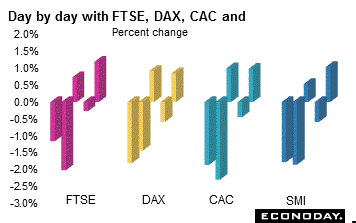 Equities retreated in midst of a flight to safety by investors. The major markets declined three of five days. The FTSE was down 1.5 percent while the DAX dropped 2.1 percent. Both the CAC and SMI lost 2.6 percent on the week. The main cause of the declines was the anxiety over the nearing vote on Brexit on June 23. As said so many times before, markets hate uncertainty. And even though no one anticipated a policy move by the Federal Reserve, the Swiss National Bank and the Banks of England and Japan, investors were hesitant to take a position prior to the banks' announcements. Equities retreated in midst of a flight to safety by investors. The major markets declined three of five days. The FTSE was down 1.5 percent while the DAX dropped 2.1 percent. Both the CAC and SMI lost 2.6 percent on the week. The main cause of the declines was the anxiety over the nearing vote on Brexit on June 23. As said so many times before, markets hate uncertainty. And even though no one anticipated a policy move by the Federal Reserve, the Swiss National Bank and the Banks of England and Japan, investors were hesitant to take a position prior to the banks' announcements.
Equities fluctuated with poll results during the week, selling off when Brexit was ahead and rallying when it was not. And it was not only equities that fluctuated. The pound sterling fluctuated along with equities while gilt yields sank. Ten year gilt yields dropped 9 basis points last week. It would have been worse except that bonds rallied Friday.
Swiss National Bank
 As widely expected, the Swiss National Bank left the target corridor for 3-month CHF (Swiss franc) Libor unchanged at minus 1.25 to minus 0.25 percent and the deposit rate steady at minus 0.75 percent. At the same time, the SNB again reiterated its view that the Swiss franc is still significantly overvalued and emphasized its willingness to intervene in the foreign exchange markets as and when necessary. As widely expected, the Swiss National Bank left the target corridor for 3-month CHF (Swiss franc) Libor unchanged at minus 1.25 to minus 0.25 percent and the deposit rate steady at minus 0.75 percent. At the same time, the SNB again reiterated its view that the Swiss franc is still significantly overvalued and emphasized its willingness to intervene in the foreign exchange markets as and when necessary.
Compared with its March projection, the conditional inflation forecast has been raised through most of next year, but only in respect of the recent rebound in oil prices. As a result, the 12-month change in consumer prices is now expected to move back into positive territory in the fourth quarter of 2016, three quarters earlier than seemed likely last time. However, the projected rate remains at only 1.2 percent by the end of 2018 suggesting that policy still has a lot of work to do.
Meanwhile the domestic economy has performed broadly in line with earlier official expectations and forecast growth in 2016 remained at 1.0 to 1.5 percent. The SNB also anticipates a continued moderate pace of expansions in the global economy but noted significant risks, among which the UK referendum on EU membership looms large. This poses a potentially serious threat to the SNB's price stability goals as a vote in favor of Brexit could see strong capital flows moving into the CHF, Europe's principal safe haven unit. To this end, the outcome of the vote will be a major focal point on the SNB's radar.
Bank of England
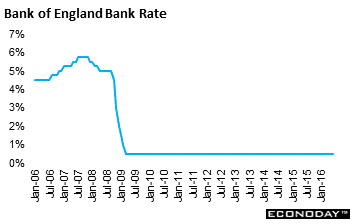 With its sights clearly focused on next week's EU referendum, the June monetary policy committee left policy on hold. The Bank Rate remains pegged at 0.5 percent and the asset purchase ceiling at Stg375 billion. As widely anticipated, the decision was unanimous. With its sights clearly focused on next week's EU referendum, the June monetary policy committee left policy on hold. The Bank Rate remains pegged at 0.5 percent and the asset purchase ceiling at Stg375 billion. As widely anticipated, the decision was unanimous.
Not surprisingly, the bulk of the talk concerned Brexit. Widespread concern was expressed about the potential fallout from a vote to leave. To this end, the Bank has already signaled its willingness to inject additional liquidity should the exit camp triumph, but a full blown monetary ease is much less certain. Most probably the MPC would want to allow time for the dust to settle before making any such decision.
Brexit aside, the minutes show that the MPC still sees the next move in the Bank Rate being up, although any tightening would be only gradual. There is nothing particularly new here except highlighting the fact that policy will become considerably more complicated should the UK decide to leave.
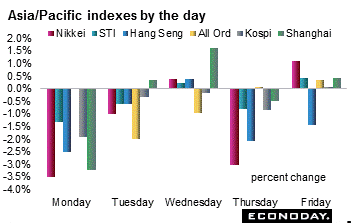 Equities retreated last week as investors became risk averse as they attempted to balance the uncertainty of the UK vote on Brexit, four central bank meetings and a seemingly ever-climbing yen. The major indexes suffered the largest losses with the Nikkei plunging 6.0 percent, the Hang Seng tumbling 4.1 percent, the Kospi sliding 3.2 percent and the All Ordinaries declining 2.7 percent. However, all Asian indexes advanced Friday thanks to higher oil prices and a weaker yen after both official groups in the EU referendum campaign suspended their activities until further notice out of respect for the late Labor MP Jo Cox. Equities retreated last week as investors became risk averse as they attempted to balance the uncertainty of the UK vote on Brexit, four central bank meetings and a seemingly ever-climbing yen. The major indexes suffered the largest losses with the Nikkei plunging 6.0 percent, the Hang Seng tumbling 4.1 percent, the Kospi sliding 3.2 percent and the All Ordinaries declining 2.7 percent. However, all Asian indexes advanced Friday thanks to higher oil prices and a weaker yen after both official groups in the EU referendum campaign suspended their activities until further notice out of respect for the late Labor MP Jo Cox.
Once again, Japanese Finance Minister Taro Aso toughened his currency rhetoric, saying the government would respond urgently if necessary to prevent "one-sided, rapid and speculative" currency moves. Investors are watching the yen closely — the currency traded at ¥103.58 during Asian hours on Thursday and many analysts think that strengthening from that level raises the likelihood that the finance ministry will intervene. Now trading near a two-year high, the stronger yen has become a major headache for the Bank of Japan because it restrains efforts to stoke inflation and spark growth, while making Japanese exports less competitive abroad.
MSCI announced before Asian markets opened Wednesday that it would for a third time withhold mainland China A shares from its benchmarks, including its MSCI Emerging Markets Index. About $1.5 trillion in assets follow this index, according to MSCI, and with some of that being from passively managed funds, analysts had expected that billions of dollars would automatically enter China's borders had MSCI said yes. By closing that door for now, MSCI delivered a blow once again to China's efforts to join international markets. Still, the benchmark provider emphasized that China was getting closer to an inclusion.
Bank of Japan
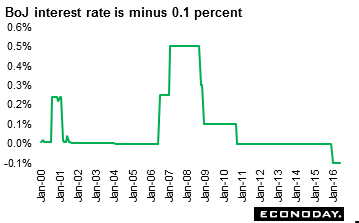 The Bank of Japan's monetary policy board kept its negative 0.1 percent interest rate as expected. It also maintained its JGB purchases at ¥80 trillion. The vote on JGB buying was 8 to 1 while the vote on the negative interest rate was 7 to 2. The BoJ did not rule out further easing. Rather it said that it would take additional measures if they are judged necessary for achieving its price stability target. The BoJ also admitted that inflation expectations have weakened. The Bank of Japan's monetary policy board kept its negative 0.1 percent interest rate as expected. It also maintained its JGB purchases at ¥80 trillion. The vote on JGB buying was 8 to 1 while the vote on the negative interest rate was 7 to 2. The BoJ did not rule out further easing. Rather it said that it would take additional measures if they are judged necessary for achieving its price stability target. The BoJ also admitted that inflation expectations have weakened.
Expectations had been that the BoJ would leave interest rates unchanged ahead of the upper house elections on July 10. In January the BoJ adopted negative interest rates, its first benchmark rate move for five years in a bid to stimulate economic growth by spurring banks to lend more actively.
Japan's gross domestic product grew at an upwardly revised annualized pace of 1.9 percent in the first quarter from the initial estimate of 1.7 percent. Prime Minister Shinzo Abe announced earlier this month that he was delaying a consumption tax increase to 2019 from 2017 on fears it could undermine domestic demand.
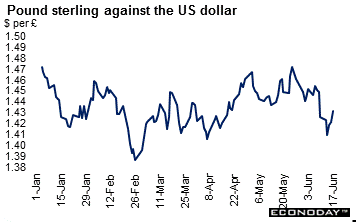 The U.S. dollar was mostly lower against its major counterparts last week. The currency declined against the euro, yen, pound sterling, Swiss franc and Australian dollar. It did rally against the Canadian dollar. The pound sterling has been deeply affected by the looming Brexit vote, fluctuating on whether the polls indicate that the UK will remain in the UK — or not. It advanced at week's end after a suspension was put in place on the Brexit arguments after the death of a member of parliament. The U.S. dollar was mostly lower against its major counterparts last week. The currency declined against the euro, yen, pound sterling, Swiss franc and Australian dollar. It did rally against the Canadian dollar. The pound sterling has been deeply affected by the looming Brexit vote, fluctuating on whether the polls indicate that the UK will remain in the UK — or not. It advanced at week's end after a suspension was put in place on the Brexit arguments after the death of a member of parliament.
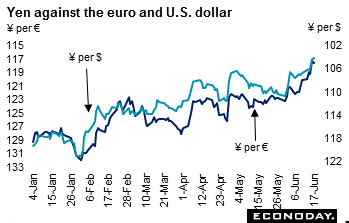 The yen neared a three-year high against the British pound Monday as concerns over the Brexit vote drove investors into assets perceived as safe. Investors fled to the safe haven yen in recent days as polls indicated a highly uncertain outcome for the June 23 "Brexit" referendum. Up until now, the financial markets have largely ignored the Brexit risk. But when the week began, they began positioning for a potential period of heightened uncertainty and volatility. The yen's strength increased pressure on the Bank of Japan but the Bank chose to do nothing to address the currency's strength. Only comments from the finance minister tried to talk the currency down. The yen neared a three-year high against the British pound Monday as concerns over the Brexit vote drove investors into assets perceived as safe. Investors fled to the safe haven yen in recent days as polls indicated a highly uncertain outcome for the June 23 "Brexit" referendum. Up until now, the financial markets have largely ignored the Brexit risk. But when the week began, they began positioning for a potential period of heightened uncertainty and volatility. The yen's strength increased pressure on the Bank of Japan but the Bank chose to do nothing to address the currency's strength. Only comments from the finance minister tried to talk the currency down.
|
|
2015 |
2016 |
% Change |
|
|
Dec 31 |
June 10 |
June 17 |
Week |
2016 |
| U.S. $ per currency |
|
|
|
|
|
|
| Australia |
A$ |
0.7288 |
0.738 |
0.740 |
0.2% |
1.5% |
| New Zealand |
NZ$ |
0.6833 |
0.706 |
0.707 |
0.1% |
3.4% |
| Canada |
C$ |
0.7231 |
0.784 |
0.777 |
-0.9% |
7.4% |
| Eurozone |
euro (€) |
1.0871 |
1.126 |
1.128 |
0.2% |
3.8% |
| UK |
pound sterling (£) |
1.4742 |
1.426 |
1.436 |
0.7% |
-2.6% |
|
|
|
|
|
|
|
| Currency per U.S. $ |
|
|
|
|
|
|
| China |
yuan |
6.4937 |
6.563 |
6.587 |
-0.4% |
-1.4% |
| Hong Kong |
HK$* |
7.7501 |
7.764 |
7.760 |
0.0% |
-0.1% |
| India |
rupee |
66.1537 |
66.760 |
67.085 |
-0.5% |
-1.4% |
| Japan |
yen |
120.2068 |
106.770 |
104.230 |
2.4% |
15.3% |
| Malaysia |
ringgit |
4.2943 |
4.072 |
4.101 |
-0.7% |
4.7% |
| Singapore |
Singapore $ |
1.4179 |
1.361 |
1.348 |
0.9% |
5.2% |
| South Korea |
won |
1175.0600 |
1165.300 |
1173.050 |
-0.7% |
0.2% |
| Taiwan |
Taiwan $ |
32.8620 |
32.315 |
32.378 |
-0.2% |
1.5% |
| Thailand |
baht |
36.0100 |
35.270 |
35.230 |
0.1% |
2.2% |
| Switzerland |
Swiss franc |
1.0014 |
0.9640 |
0.9599 |
0.4% |
4.3% |
| *Pegged to U.S. dollar |
|
|
|
|
|
|
| Source: Bloomberg |
|
|
|
|
|
|
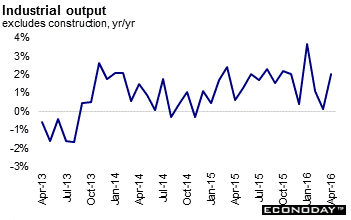 April industrial production (excluding construction) was up 1.1 percent on the month following a revised decline of 0.7 percent. Annual workday adjusted growth was 2.0 percent, up from 0.2 percent last time and a 3-month high. All of the major subsectors posted monthly gains. Durable consumer goods (2.3 percent) led the way but capital goods (1.9 percent) and non-durables (1.6 percent) similarly recorded solid increases while intermediates (0.4 percent) and energy (0.3 percent) also advanced. Regionally, a 1.1 percent monthly increase in Germany and a 1.2 percent bounce in France were instrumental but, while Italy (0.5 percent) also saw positive growth, Spain (minus 0.1 percent) recorded its third loss in the last four months. April industrial production (excluding construction) was up 1.1 percent on the month following a revised decline of 0.7 percent. Annual workday adjusted growth was 2.0 percent, up from 0.2 percent last time and a 3-month high. All of the major subsectors posted monthly gains. Durable consumer goods (2.3 percent) led the way but capital goods (1.9 percent) and non-durables (1.6 percent) similarly recorded solid increases while intermediates (0.4 percent) and energy (0.3 percent) also advanced. Regionally, a 1.1 percent monthly increase in Germany and a 1.2 percent bounce in France were instrumental but, while Italy (0.5 percent) also saw positive growth, Spain (minus 0.1 percent) recorded its third loss in the last four months.
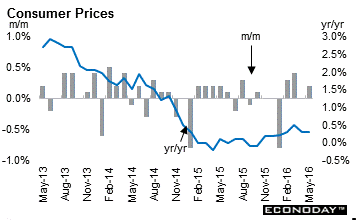 May consumer prices were up 0.2 percent on the month and unchanged at 0.3 percent from a year ago. The main upward pressure on the change in the yearly rate between April and May came from transport where prices rose 0.9 percent on the month compared with a 0.6 percent increase over the same period a year ago. Restaurants & hotels (0.5 percent after 0.2 percent) and communications (0.9 percent after minus 0.3 percent) also provided a lift. At the same time, clothing & footwear (minus 0.2 percent after 0.5 percent), recreation & culture (minus 0.4 percent after minus 0.1 percent) and food & non-alcoholic drinks (minus 0.4 percent after minus 0.1 percent) had the main negative impacts. The core CPI matched the headline 0.2 percent monthly gain which left its yearly rise steady at 1.2 percent. May consumer prices were up 0.2 percent on the month and unchanged at 0.3 percent from a year ago. The main upward pressure on the change in the yearly rate between April and May came from transport where prices rose 0.9 percent on the month compared with a 0.6 percent increase over the same period a year ago. Restaurants & hotels (0.5 percent after 0.2 percent) and communications (0.9 percent after minus 0.3 percent) also provided a lift. At the same time, clothing & footwear (minus 0.2 percent after 0.5 percent), recreation & culture (minus 0.4 percent after minus 0.1 percent) and food & non-alcoholic drinks (minus 0.4 percent after minus 0.1 percent) had the main negative impacts. The core CPI matched the headline 0.2 percent monthly gain which left its yearly rise steady at 1.2 percent.
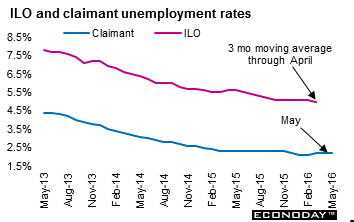 May claimant count joblessness was down 400 but only after April's decline had been revised to a 6,400 increase. As a result, the unemployment rate held steady at 2.2 percent. The ILO data showed the number of people out of work falling 20,000 over the February to April period which in turn saw the its jobless rate decline a tick from the first quarter to 5.0 percent. This was its lowest level in more than a decade. Some additional evidence that the jobs market might be holding up surprisingly well was also provided by the earnings figures. These put annual growth in the three months to April at 2.0 percent. Excluding bonuses, the rate was 2.3 percent, up 0.1 percentage points from a stronger revised reading last time. May claimant count joblessness was down 400 but only after April's decline had been revised to a 6,400 increase. As a result, the unemployment rate held steady at 2.2 percent. The ILO data showed the number of people out of work falling 20,000 over the February to April period which in turn saw the its jobless rate decline a tick from the first quarter to 5.0 percent. This was its lowest level in more than a decade. Some additional evidence that the jobs market might be holding up surprisingly well was also provided by the earnings figures. These put annual growth in the three months to April at 2.0 percent. Excluding bonuses, the rate was 2.3 percent, up 0.1 percentage points from a stronger revised reading last time.
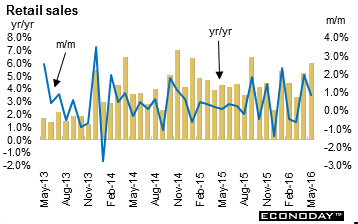 May retail sales were up 0.9 percent after an upwardly revised increase of 1.9 percent in April. On the year, purchases climbed to 6.0 percent, up from 5.2 percent last time and the best performance since September 2015. Excluding auto fuel the picture was little different with a hefty 1.0 percent gain compounding an upwardly revised 2.0 percent surge at the start of the quarter. This lifted yearly growth from 4.8 percent to 5.7 percent. May's jump reflected broad-based monthly increases among the major subsectors. Within a 0.7 percent increase in non-food volumes, clothing & footwear spiked 4.3 percent and non-specialized stores gained 1.1 percent. Household goods were up 0.9 which, with non-store retailing 2.3 percent firmer, left the other stores category (minus 2.7 percent) as the only loser. Food purchases rose 1.1 percent and auto fuel 0.2 percent. May retail sales were up 0.9 percent after an upwardly revised increase of 1.9 percent in April. On the year, purchases climbed to 6.0 percent, up from 5.2 percent last time and the best performance since September 2015. Excluding auto fuel the picture was little different with a hefty 1.0 percent gain compounding an upwardly revised 2.0 percent surge at the start of the quarter. This lifted yearly growth from 4.8 percent to 5.7 percent. May's jump reflected broad-based monthly increases among the major subsectors. Within a 0.7 percent increase in non-food volumes, clothing & footwear spiked 4.3 percent and non-specialized stores gained 1.1 percent. Household goods were up 0.9 which, with non-store retailing 2.3 percent firmer, left the other stores category (minus 2.7 percent) as the only loser. Food purchases rose 1.1 percent and auto fuel 0.2 percent.
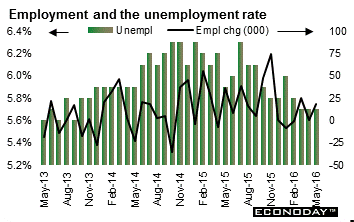 May unemployment rate remained at 5.7 percent for a third month while employment increased by a greater than anticipated 17,900. The labour force participation rate was unchanged at 64.8 percent. May part time employment was up 17,900 while full time employment remained steady. Unemployment increased 1,600. The number of unemployed persons looking for full-time work declined 6,200 and the number of unemployed persons only looking for part-time work increased 7,800. The seasonally adjusted employment to population ratio remained steady at 61.1 percent in May 2016. May unemployment rate remained at 5.7 percent for a third month while employment increased by a greater than anticipated 17,900. The labour force participation rate was unchanged at 64.8 percent. May part time employment was up 17,900 while full time employment remained steady. Unemployment increased 1,600. The number of unemployed persons looking for full-time work declined 6,200 and the number of unemployed persons only looking for part-time work increased 7,800. The seasonally adjusted employment to population ratio remained steady at 61.1 percent in May 2016.
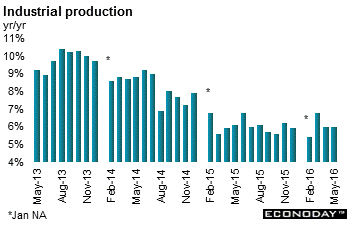 May industrial production was up 6.0 percent from a year ago for a second month and slightly above expectations of a 5.9 percent increase. On the month, output was up 0.45 percent after 0.47 percent the month before. For the five months through May, output was up 5.9 percent on the year. Manufacturing output increased 7.2 percent on the year after adding 6.9 percent in April. Most major industries produced more in May than in April. The exception was non-metal minerals and textiles. Of the major products, only coal declined, dropping 15.5 percent after tumbling 11.0 percent the month before. May industrial production was up 6.0 percent from a year ago for a second month and slightly above expectations of a 5.9 percent increase. On the month, output was up 0.45 percent after 0.47 percent the month before. For the five months through May, output was up 5.9 percent on the year. Manufacturing output increased 7.2 percent on the year after adding 6.9 percent in April. Most major industries produced more in May than in April. The exception was non-metal minerals and textiles. Of the major products, only coal declined, dropping 15.5 percent after tumbling 11.0 percent the month before.
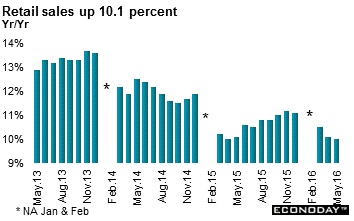 May retail sales were up 10.0 percent on the year as expected. On the month sales increased 0.76 percent. For the five months through May, sales were up 10.2 percent when compared with the same time period a year ago. Urban sales were up 9.9 percent after a 10.0 percent rise in April. Rural retail sales also eased slightly, increasing 10.7 percent after 10.9 percent the month before. The only categories of sales that declined in May were gold, silver & jewelry and oil & oil products. However auto sales improved on the month, increasing 8.6 percent after rising only 5.1 percent in April. May retail sales were up 10.0 percent on the year as expected. On the month sales increased 0.76 percent. For the five months through May, sales were up 10.2 percent when compared with the same time period a year ago. Urban sales were up 9.9 percent after a 10.0 percent rise in April. Rural retail sales also eased slightly, increasing 10.7 percent after 10.9 percent the month before. The only categories of sales that declined in May were gold, silver & jewelry and oil & oil products. However auto sales improved on the month, increasing 8.6 percent after rising only 5.1 percent in April.
Four central banks — the Federal Reserve, Swiss National Bank and the Banks of Japan and England — met and kept their respective monetary policies unchanged. Financial markets were volatile as the date nears for the UK vote on whether the country will remain in the European Union. Economic data were mixed globally.
The UK vote on Brexit takes place on Thursday, June 23. Fed Chair Janet Yellen testifies to the U.S. Congress on Tuesday and Wednesday. Flash June PMIs will be reported for Japan, the U.S., Eurozone, France and Germany. Germany's ZEW and Ifo surveys for June will be reported.
| The following indicators will be released this week... |
| Europe |
|
|
| June 20 |
Germany |
Producer Price Index (May) |
| June 21 |
Germany |
ZEW Survey (June) |
| June 22 |
Eurozone |
EC Consumer Confidence Survey (June flash) |
| June 23 |
Eurozone |
Manufacturing, Services & Composite PMI (June flash) |
|
Germany |
Manufacturing, Services & Composite PMI (June flash) |
|
France |
Manufacturing, Services & Composite PMI (June flash) |
| June 24 |
Germany |
Ifo Survey (June) |
|
France |
Gross Domestic Product (Q1.2016 final) |
| |
|
|
| Asia/Pacific |
|
|
| June 20 |
Japan |
Merchandise Trade (May) |
| June 23 |
Japan |
Manufacturing PMI (June flash) |
| |
|
|
| Americas |
|
|
| June 22 |
Canada |
Retail Sales (April) |
Anne D Picker is the author of International Economic Indicators and Central Banks.
|

